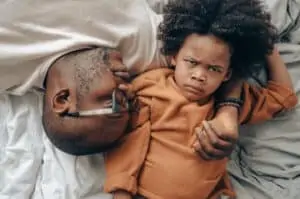I couldn’t have been more than 4 years old, but I still remember it to this day. My mom took me to the playground, and I ran up to the swings. I didn’t see that another child had been waiting and gleefully hopped on the swing. The mom of that child yelled at me and made me cry.
My mom was furious.
As a mom now myself, I’d be furious too. There are better ways to handle something like this, which I’ll get to below.
When someone else corrects your child or is just plain rude to them, what do you do? We can all take a page from my mom, who is a total mama bear. Whether a neighbor is shouting at my child or another parent threatened my child, I’m on it.
I also recall being at a diner, perhaps around the age of 7. I’d been very well-behaved and eaten my lunch properly. Mom said I could have dessert. When the waitress came back to our table, I ordered my dessert. The only problem was they were out of what I’d requested.
So, I looked over the dessert section again. That’s when she yelled, “Come on, kid! I don’t have all day!” You better believe Mom was livid. The manager came over and apologized profusely, but it still left a mark on my mind. I didn’t even want dessert anymore after that incident.
Is it ever OK for another parent to yell at your child? How about yelling at the annoying neighbor kid? All these burning questions have answers, so read on to find out.
How do you tell a friend or family member not to discipline your child?
Let’s start from the beginning. When one of my best friends told me, “Another parent yelled at my child,” I didn’t want to seem uncaring, but I had to ask some more questions to determine whether it was deemed OK or not.
Was the behavior dangerous?
I am fully on board with my cousin, my best friend, teachers, and my own parents yelling at my children if they are doing something hazardous. If shouting, “Stop! Get over here now!” at the moment saves my child or another one from harm, I’m all for it.
But if that other adult is yelling at my child much in the way the mom yelled at me about the swings or that mean waitress yelled at me, it’s not acceptable. Not at all.
Are you on their turf?
Someone wrote me and told me, “My neighbor is harassing my child.” I asked what they meant by that and was told that the neighbor complained about my child because she went into her yard.
While yelling is not ideal in this situation, if there is no imminent danger (like a large guard dog, un-gated pool, or large hole in the ground, for example), it is that person’s property. I’ve lived in plenty of places where the noisy neighbors child was intruding in our space.

In those instances, I’ve calmly told the child they can’t come into our yard without their parents. I’ve never had to yell, but if there was something dangerous, I definitely would. You could get slapped with a lawsuit if a child gets injured on your property, even if their parents are negligent in keeping them away.
All told, though, if you’re in someone else’s house, your child needs to be taught that we obey other people’s house rules. This is the easiest way to avoid trouble anywhere you go. In your house, it’s your rules, but in their house, what they set as rules should be followed.
Giving your children a basic sense of obeying adults in charge, whether it’s Grandma and Grandpa, their teacher, the babysitter, their aunt or uncle, and so on, is something you MUST do as a parent. You can’t be around your child 24/7 as they get bigger, so what you instill in them really matters.
That being said, no one should yell at your child. Ask them not to do something, you bet. Calmly correct behavior? Of course. But if I get wind that someone yells at either of my girls and they’re not in danger or causing something dangerous, I’ll be furious. Let me know so that I can deal with their behavior later as their parent.
I do know a few mamas that team together to watch each other’s kids. They stay at home and take turns so each mama can run errands and stuff like that. These mamas have agreed to put little ones in timeout when they cause trouble. I like this arrangement because they’ve all come together and are on the same page about this.
If you have little ones that will be under the watchful eye of someone else (related or not), it behooves you to have this discussion of what is and isn’t acceptable on both sides. This way, everyone is happy with the arrangement.
Should you ever discipline another person’s child?
So, I think I’ve fairly covered what to do when someone else corrects your child. But what if the tables are turned…should you ever discipline another person’s child?
Again, this all depends. If that child’s parents are there, you should let them handle it. In my experience, most parents will notice if their child is behaving in an unsavory fashion.
Other times though, you might have rules for your household that they don’t. Still, don’t yell unless someone is about to get seriously injured if you don’t yell to stop them. A better way to handle it is to explain the rules to the kids. You can also redirect them to a safer activity.
Your ultimate goal with other people’s children is to keep them safe. Prevent misbehavior as much as you can, and if the child’s parent is there, let them know kindly.
“Little Timmy was pulling on the cat’s tail. We certainly don’t want him to get hurt as a result.”
Of course, parents that don’t immediately step in after being told something like that are the kind of parents I will avoid, like the plague.
How do you know when to intervene?
Even if a parent yells at you for it, you will sleep easier at night for yelling and/or correcting behavior when it is far more dangerous not to. For example, if the noisy neighbor child runs after a ball into the street, you are well within your rights to do everything necessary to stop them. That means screaming, chasing after them, and scooping them up out of the road to keep them from being hit.
Other behaviors that would warrant you taking action include:
- Aggressive behavior like hitting, biting, punching, kicking, or throwing hard toys that they’re using as a weapon
- Harmful behavior like the example mentioned above about chasing the ball into the street
- Destruction of property (you have every right to protect your belongings)
- Hurting a family pet
- Picking up a baby or pushing it in the stroller without expressed permission from the parent of the baby
How to know when to step in with disciplining another person’s child

Aside from dangerous circumstances, you might be wondering when to say something to another person’s child.
Consider the following:
- Make sure you’re being omniscient. There are two sides to every story.
- Let the kids try to get their behavior on track before you step in.
- If the parents are there, let them lead in correcting their child’s behavior.
- Do not put your hands on anyone else’s child unless you’re grabbing them from falling into a pool or lake or running in front of a moving car.
- When correcting behavior, make it teachable rather than a punishment.
- Always let a child’s parents know of this intervention when they are not present.
Remember, if you’re the host of the playgroup or a birthday party, you’re in charge. And while some behavior might not be up to your standards, you may need to let it go unless it’s unsafe or harmful to themselves or others.
With younger children, if you must step for the sake of obeying your household rules, do so kindly. Get down to their level to make eye contact and use a gentle tone of voice. Kids in the younger age group are much easier to distract too.
“I see you like throwing things. I like throwing things too, but in our house, we don’t throw the pillows off the couch. Here are some bean bags you can throw into this basket. It’s so much fun! Do you want to try it?”
If the behavior is less benign, make a general announcement to all kids, including your own. “Hi everyone! Just a reminder that in this house, we don’t throw things. We have a lovely yard outside so if you’d like to play catch there, let’s go there and play it.”
What do you do when someone yells at your child?
For starters, before you go barging over to your neighbor’s house for yelling at your child or get angry with another adult that was in charge of your child, find out what happened.
My friend, Elena’s daughter, was 7 at the time when she picked her up from a friend’s house. Elena said Marie looked like she’d been crying. When she got in the car, she began bawling. She told her friend’s mom yelled at her.
Elena was angry, but she kept her cool. She asked her daughter to tell her what had happened. Apparently, the girls went outside to play, but Marie’s friend’s mom had asked them not to go outside. This was because she was inside taking care of her 3-month-old baby, and she couldn’t keep an eye on them. They have a pool, and she didn’t want the girls playing unsupervised near it.
The mom yelled because she saw the girls putting their dolls into the pool when she looked up. Marie was leaning over the edge, and the mom screamed at them to get away from the pool from the upstairs window, running until she reached them.
Once Elena found out why the mom yelled, she wasn’t angry. She was glad the mom stopped them from doing something that could have ended in tragedy as Marie hadn’t had any swimming lessons.
But what about when your child doesn’t do anything to warrant being yelled at? You can talk to that parent about how you feel about it, of course. However, if you’re not satisfied with their reasoning or the stories don’t align, my recommendation is to limit your time with the people in question or make sure you are around the next time to make your observations.
Is it illegal to yell at a child?
No, yelling at a child isn’t illegal. Goodness, I’ve yelled at my kids before. We’ve all done it when safety protocols are breached, or we’re at the end of our rope. I’ve got a great article about what to do about yelling you should read.
While yelling itself isn’t illegal, you should make sure the yelling isn’t a form of verbal abuse. Yelling, “Be quiet!” isn’t abusive, for example.
This is important:
According to the Indiana Chapter of National Children’s Alliance, it’s not the yelling itself that is the problem. If you call them names that aren’t meant in affection, curse at them, hurl insults, and these sorts of behaviors, that’s when it could be deemed verbal abuse.
There is a difference between yelling and being verbally abusive.
Sometimes we have a bad day and yell. Should you notice you engage in this kind of destructive behavior often, or you engage in it with other people’s children, you should get to the root of it. There’s definitely help to get you back on track and feeling like yourself.
Is it okay for a parent to threaten their child?
That depends on the threat. I will often threaten my daughters with taking away their tablets if they don’t correct their behavior. However, I will never threaten them that I’m going to harm them. There’s a big difference.
You may want to review this list of what child abuse is. Yes, spanking is allowed when done properly, but if you exhibit any of these behaviors or the parent of a child you know does, you may want to check the Child Welfare Information Gateway. This site can tell you more about what is deemed abuse in your state and when, where, and how you can help a child that is truly in danger.
Final thoughts on discipline and yelling…
Yelling in and of itself is not abusive behavior. Yelling at other children isn’t OK unless there’s something dangerous happening. Raise your children to know how to behave in other people’s homes and with good manners, and it will be very unlikely they’ll ever cry to you about being yelled at.
Leslie Berry lives with her husband and two young daughters in Los Altos, California, where she loves helping other moms get comfortable with motherhood and embracing the insanity with facts peppered with laughs.
She loves eating too much sushi, exercising, and jamming out on her Fender. Read more about Leslie here.






